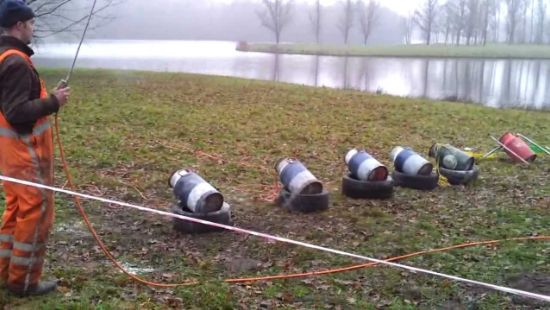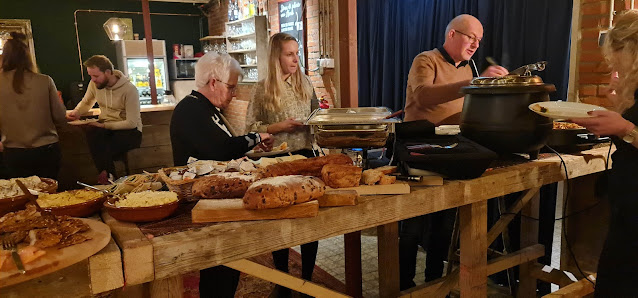Week 3 (again)
(Sunday morning - I cheated this week and wrote some of this on Saturday evening whilst Janny was was watching some so-called "reality" TV).
We're driving down to Amsterdam this morning to pick up some of Ben's stuff - he has sub-let his apartment for the 2 months that he will be in Cape Town.
During my walk this morning I listened to the Al Franken Podcast (available on Sundays). Rather chilling this week...
I only know one Canadian...
...some of the podcasts I listen to poke a bit of fun at how "polite" Canadians are. My single aquaintance would confirm that idea.
But, that aside, I was interested in this article about Canada being prepared for events in America.
https://www.theglobeandmail.com/opinion/article-the-american-polity-is-cracked-and-might-collapse-canada-must-prepare/
One of the comments had this to say...
This is a great analysis by Thomas Homer Dixon, one of Canada's premier intellectuals. Critics will need to study the library of deep resources and evidence used to produce this opinion piece to supply viable counterarguments.
Homer Dixon's The Upside of Down is one of the best works on societal resilience and collapse caused by climate disruption, resource scarcity, war, etc. I have read. His latest book Hope is a tough read, but important nonetheless. Both books occupy a prominent place on our bookshelves.
Obviously, Canada now has to grow up and learn to be more independent, especially from the US. That lesson will be very, very hard if the American polity suddenly goes south, so to speak, and Canada is caught unprepared because its leadership didn't heed warnings like Homer Dixon's. Homer Dixon's prescriptions to work on strengthening our ties with the EU and democratic Asia, as well as striking a parliamentary committee to look into analyzing and providing recommendations to this issue on a full-time basis, are especially relevant.
More podcasts...
In my attempts to get away from my increasingly depressing podcasts, I went looking for some more Dutch stuff - now that I feel confident that I can understand it.
But, one of the first I found was in English - titled "The History of the Netherlands" - probably should have listened years ago! ( there is an Aussie involved and a chap with a Polish looking name but who also grew up in Germany and Australia).
This is on my computer - with a lot of reading to go with it - a podcast site probably has it as well - I use the freebie from Google.
(Not for the faint-hearted - there are 56 episodes!)
https://www.republicofamsterdamradio.com/historyofthenetherlands
This is the text for episode 15, for example
Episode 15: Fuelling the Flames of Frisian Freedom
Friesland was an autonomous anomaly in Europe, free from the feudal obligations that had so deeply entrenched themselves in society everywhere else. For years the Frisians just rocked along, doing their own thing, which generally involved something to do with cows. We have largely avoided talking about them for a few episodes, but now is the time in our journey through the History of the Netherlands to look at exactly what the Frisians were doing in the 1300s that was not cow related. Put simply, for the first forty-four years of the fourteenth century forces and factions fought and feuded in Friesland, fueling the flames of fearless Frisian freedom fighters. In 1345, Frisian farmers and fishermen on the eastern side of the Zuiderzee would meet and defeat the Count of Holland in battle at Stavoren, an event that would unite people in East-Friesland and ensure that the autonomy they enjoyed known as “Friese Vrijheid”, Frisian freedom, would continue for another 150 years.
When I first searched in Google's podcast site, I found
Those Conspiracy Guys
doing a Swapcast - I think the idea is that they get people who have podcasts to come and talk about it in this format.
So they had a chat with the makers of The History of the Netherlands...
it was quite entertaining and informative. I found myself having a laugh while I was sanding and oiling the mast...
They mentioned one of the things that I had figured out for myself - that the Dutch have had to learn how to live with the water. But they also came up with a few cultural things like "why are they a fairly tolerant people"? with all sorts living together in (apparent) harmony.
The reason put forward was that they always had the common threat of flooding and so it had to be in everybody's interest to work together. eg a dyke in one area would be of little point if neighbouring communities didn't go along with it.
Even the political process after an election is an example of how they have to "come together" to get anything done. ie no one party has a majority and so they have to go through the coalition process of negotiation and compromise - the last such process took almost a year to get sorted out (after the election of March 2021).
I also learnt a new saying (which Janny confirmed when I asked about it)...
It also goes towards "tolerance"...
" I don't mind if you shit on the table, just so long as it doesn't splatter on to my plate."
Preparing the mast...
I had to sand it back to get rid of the years of varnish - at one stage it looked blocky and streaky - so much so that I looked up the price of a new one (€226,00). This one cost €100,00 in 2008.
But, with the help of one of the clients, we kept on sanding...and sanding! It had actually faded over the years, so I had to get rid of all the light colouring. I hadn't even noticed that it had uniformly faded so much.
With varnish last week...
Sanding...
I also had to replace the fittings for the navigation lamps... Sander, our boat expert had found one of the old fittings in a box in his garage...otherwise I would have had a much bigger job to replace them - I just don't think they are available anymore - after nearly 50 years.
With the lamps back and a bit of oil
Fines on the water
Sailing (ie motoring) at a higher speed than permitted is definitely at the top of the list of violations by recreational skippers on the Rijkswateren in 2021.
That is what Rijkswaterstaat reports. Mobile traffic controllers - all BOAs** - of Rijkswaterstaat wrote 137 fines in 2021 for sailing too fast with a fast motorboat.
The top three violations in 2021, as identified by the Rijkswaterstaat traffic controllers, are as follows:
Sailing (motoring) too fast by fast motor boats: 137
No use dead man's switch: 107
Small ship (our category) motoring too fast: 75
Other violations that the mobile traffic controllers often see:
No life jacket when sailing while standing (59),
no sailing/boating license (41)
and not keeping starboard (on the right) (37).
Also striking is the large increase in the number of fines issued:
507 in 2021 compared to 107 in 2020.
Rijkswaterstaat explains this increase, among other things, by greater pressure on the water in 2021; more and more holidaymakers are seeking out the water.
** BOA
Buitengewoon opsporingsambtenaar
Buiten = outside
gewoon = normal/ordinary
spor = trail, so opsporing could be "on the trail of" or "investgating" :-)
An extraordinary investigating officer (boa) is an official with specific investigative powers. This means, among other things, that he/she may investigate whether certain criminal offenses have been committed. Boas are allowed to arrest suspects, check someone's identity, prepare official reports and issue fines.
Counting the shipwrecks (wrakkentelling)
At the request of the House of Representatives, the National Cultural Heritage Agency (RCE) investigated sunken and missing Dutch-owned ships in the world. The data of a total of 1626 ships of the Dutch East India Company (VOC), West India Company (WIC), the Admiralties and the Royal Navy, as well as WW1 and WW2 ships have been brought together and published in this report.
The orange colour is for state ships. The blue on the right is for private ships. The one blue on the left is for warships.
In 1992, when Janny and I were married, I was living at the Port Melbourne Fire Station. I had a piggy bank - a metal can with a $20.00 note depicted on the side - a proper money box - which I had been filling with spare change for quite a few years. I even had it for the 2 years in Darwin.
Anyway, we used it to buy a new fridge and a washing machine, plus a few other things for the new house at Lower Plenty.
They both made their way over to here - the washing machine didn't last that long, but does have a story of it's own.
The fridge, however, was larger than "normal" fridges over here and served us very well - until this week! It was still working OK, but we are getting more and more energy conscious - and so it had to go... it was used by all our groups and the refugees over the years.
A more eficient, fridge only...
We have 2 new clients in the DayWork area (dagbesteding). One seems to be very creative - she drew this from scratch and has been giving Janny lots of ideas for other things to do...(we try to fit in with what the clients want to do).
The other is a woman who used to play clarinet in the ( is there only one?) Conservatorium of Music. Her son has just graduated as a firefighter! (she's only been for one morning so far - so I haven't had a chat yet).















Did I tell you about the podcasts I listen to? “Stuff you should know” & “Dan Snows history hit”.
ReplyDelete